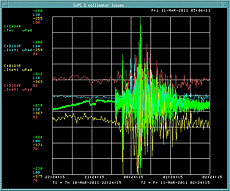Japanese earthquake jolts Tevatron, emotions
 |
|
This screen image from the Tevatron main control room shows how the earthquake in Japan March 11 affects superconducting quadrupole magnets in the accelerator tunnel.
|
Editor’s note: Fermilab stands in solidarity with Japan. We have very strong collaborations with Japanese scientists and institutions, particularly at the laboratory KEK and at universities throughout the country. Our thoughts are with our Japanese colleagues, friends and their families in the aftermath of the tragedies that have taken place. Read more in this message from Director Pier Oddone.
When the 8.9-magnitude earthquake struck Japan last week, Fermilab felt the jolt emotionally and physically.
Accelerator operators in the main control room of the Tevatron saw the heart-rate-monitor-style tracking system for the more than 1,000 superconducting magnets go into cardiac arrest. This signaled the forward and backward pitch and side-to-side roll of the 4- ton, 20-foot-long magnets buried underground.
And that meant somewhere, something very bad had happened.
The monitor readings came from sensors called tiltmeters on underground magnets that steer particles around the four-mile Tevatron ring. They record vibrations too tiny for people at the laboratory to feel, including seismic waves from earthquakes thousands of miles away. The last time the magnets rocked like that was in 2010 when a 7-magnitude quake struck Haiti. The Tevatron also recorded a 2007 quake in Mexico, a 2006 quake in New Zealand, and earthquakes that triggered deadly tsunamis in Sumatra in 2005 and Indonesia in 2004. In all, the Tevatron has felt disaster more than 20 times.
A December 2010 symmetry magazine article explains how physicists first noticed the Tevatron’s super sensitivity, and how they work to make sure it doesn’t interrupt the laboratory’s multi-million-dollar research efforts.
For accelerator operators, learning that the computer sqiggles signaled a quake in Japan was an emotional blow. Fermilab has a long and fruitful history of working with Japanese physicists and institutions. Japanese scientists have been involved with Fermilab from about the beginning of the experimental program in the early 1970s and became key members of the Tevatron’s CDF collaboration in the early 1980s. Many Fermilab scientists, engineers and technicians have friends in Japan, from Japan or have worked at its high-energy physics laboratory, KEK, or JPARC, the high-energy accelerator complex.
In 2010, the most recent data available, Fermilab had 80 visiting researchers from Japanese institutions spread throughout the country, including the areas hardest hit by the earthquake and tsunami. Those scientists are valuable members of several experiments, particularly the CDF collaboration and the accelerator research program. In all likelihood, the Japanese contribute even more to Fermilab’s research program because the also work at the laboratory as users from non-Japanese institutions, but a statistic on the number of those users is unavailable.
-- Tona Kunz
Read this article at Quantum Diaries.
|